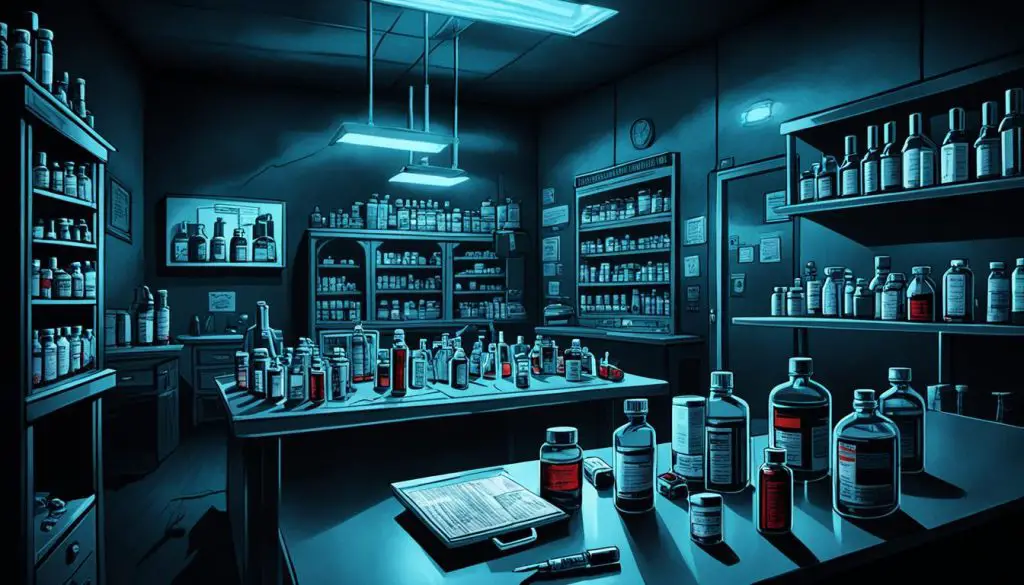Ad Blocker Detected
Our website is made possible by displaying online advertisements to our visitors. Please consider supporting us by disabling your ad blocker.
Testosterone therapy is a popular option for men experiencing age-related decline in testosterone levels. It can help improve various symptoms associated with low testosterone, such as decreased sex drive, fatigue, and loss of muscle mass. While testosterone therapy can be beneficial, it’s crucial to be aware of certain precautions and risks to ensure your safety and well-being throughout the treatment.
Key Takeaways:
- Understand the potential risks and precautions associated with testosterone therapy.
- Ensure you obtain testosterone from legitimate sources and with a proper prescription.
- Explore individualized treatment options and work with a knowledgeable provider to determine the best delivery system.
- Make lifestyle changes such as regular exercise, healthy eating, and avoiding substance use to optimize the effectiveness of testosterone therapy.
- Regularly follow up with your healthcare provider and adhere to the prescribed treatment plan.
Understanding Testosterone and Aging
Testosterone is a hormone primarily produced in the testicles that plays a vital role in maintaining bone density, muscle strength, sex drive, and other important functions in men. As men age, testosterone levels naturally decline, leading to a variety of changes in the body.
This age-related decline in testosterone production is a normal part of the aging process. However, in some cases, this decline can result in a condition called hypogonadism, where the body doesn’t produce enough testosterone to function optimally. Hypogonadism can cause a range of symptoms, including:
- Decreased libido
- Reduced muscle mass and strength
- Fatigue and decreased energy levels
- Mood changes, such as irritability or depression
- Increased body fat
- Difficulty concentrating
If you’re experiencing any of these symptoms, it’s important to consult with your healthcare provider, who can conduct tests to assess your testosterone levels and determine if treatment is necessary.
It’s worth noting that low testosterone symptoms can vary from person to person, and some men may not experience any symptoms at all. Regular monitoring of testosterone levels can help identify any age-related decline or hormonal imbalances that may require intervention.
Benefits and Risks of Testosterone Therapy
Testosterone therapy is often considered as a way to counteract age-related decline in testosterone levels. While it may offer certain health benefits, it is important to understand the potential risks and misconceptions associated with this treatment.
Health Benefits
Testosterone therapy can provide various benefits for men experiencing age-related decline in testosterone levels. These may include:
- Increased energy levels
- Improved mood and well-being
- Enhanced muscle mass and strength
- Improved sexual function and libido
- Increased bone density
However, it’s important to note that the health benefits of testosterone therapy for normal aging are still not well-established. Individual responses to therapy may vary, and consultation with a healthcare provider is essential.
Risks of Testosterone Therapy
While testosterone therapy can have potential benefits, it also carries certain risks that should be considered before starting treatment:
- Sleep Apnea: Testosterone therapy may worsen sleep apnea, a condition characterized by pauses in breathing during sleep.
- Prostate Health: Testosterone therapy has the potential to stimulate prostate growth, which may increase the risk of prostate issues.
- Blood Clot Risk: Testosterone therapy can elevate the risk of blood clots, which may lead to serious complications.
- Heart Disease Risk: There is some evidence that testosterone therapy may contribute to an increased risk of heart disease in certain individuals.
It is crucial to discuss these risks with a healthcare provider and weigh them against the potential benefits when considering testosterone therapy.

Avoid Illegitimate Testosterone Sources
When it comes to testosterone therapy, it is crucial to obtain your medication from legitimate sources and with a proper prescription. Avoid the temptation of purchasing black market testosterone, as it can pose significant risks to your health and wellbeing.
The black market is flooded with illegal testosterone sources, making it difficult to guarantee the quality and safety of the medication. These products may be counterfeit, contaminated, or improperly manufactured, putting you at risk of adverse effects and unreliable results.
To ensure the effectiveness and safety of your testosterone therapy, it is essential to rely on reliable pharmacies that adhere to FDA regulations. These reputable establishments provide quality guarantee and prioritize your well-being. By obtaining testosterone from reliable pharmacies, you can have peace of mind knowing that you are receiving a genuine product that meets rigorous standards.
The Dangers of Black Market Testosterone
Purchasing testosterone from illegal sources not only carries safety concerns, but it also puts you at risk of legal consequences. Black market vendors operate outside of the law and often engage in illicit activities, making the trade of testosterone a criminal act.
Additionally, illegitimate testosterone sources lack proper oversight and quality control. Without a valid prescription, you may be unknowingly putting yourself at risk of harmful side effects and ineffective treatment.
Obtaining testosterone from black market vendors is like playing Russian roulette with your health. By choosing to navigate the legal and regulated channels of testosterone therapy, you can avoid unnecessary risks and ensure the highest level of care and quality.
Proper Prescription and Reliable Pharmacies
Receiving a proper prescription is crucial for testosterone therapy. A qualified healthcare provider will assess your individual needs, review your medical history, and determine the appropriate dosage and treatment plan for you. This personalized approach ensures that you receive the optimal benefits of testosterone therapy while minimizing potential risks.
When filling your prescription, it is essential to choose a reliable pharmacy that specializes in testosterone therapy. These pharmacies prioritize patient safety and follow strict guidelines to ensure the authenticity and quality of the medication.
By working closely with your healthcare provider and relying on reputable pharmacies, you can have confidence in the safety and effectiveness of your testosterone therapy.

| Benefits of Proper Prescription and Reliable Pharmacies |
|---|
| Ensures the authenticity and quality of the medication |
| Minimizes the risk of harmful side effects |
| Provides proper dosage and treatment guidance |
| Offers peace of mind and confidence in the therapy |
Individualized TRT Protocols and Lifestyle Changes
When it comes to testosterone replacement therapy (TRT), there are various treatment options available to suit different individuals. Your knowledgeable healthcare provider will help determine the best delivery system for you, based on your specific needs and preferences. Here are some common testosterone treatment options:
- Injections: Administered either by a healthcare professional or self-administered at home, injections provide a convenient and effective way to deliver testosterone into the body.
- Topical Gels: These gels are applied directly to the skin, allowing for absorption of testosterone into the bloodstream.
- Pellets: Small pellets containing testosterone are implanted under the skin, releasing a steady and consistent dose over several months.
- Nasal Applications: Nasal gels or sprays offer an alternative method of delivering testosterone, absorbing through the nasal membranes.
It’s important to note that the effectiveness of any delivery system may vary depending on the individual. Therefore, a personalized, individualized TRT plan is crucial to ensure optimal outcomes.
Optimizing TRT with Lifestyle Changes
In addition to testosterone treatment options, certain lifestyle changes can enhance the effectiveness of TRT and contribute to overall well-being. Consider incorporating the following practices into your daily routine:
- Regular Exercise: Engaging in regular physical activity, such as strength training and cardiovascular exercises, can help improve testosterone levels and promote general health.
- Healthy Eating: Maintain a balanced diet rich in fruits, vegetables, lean proteins, and whole grains to support optimal hormone production and overall wellness.
- Avoiding Substance Use: Limit alcohol consumption and avoid recreational substance use, as they can negatively impact testosterone levels and overall health.
By combining testosterone treatment with healthy lifestyle choices, you can maximize the benefits of TRT and improve your well-being.

Regular Follow-Up and Sticking to the TRT Plan
Regular follow-up with your healthcare provider is crucial to optimize your testosterone levels and ensure the effectiveness of your TRT (Testosterone Replacement Therapy) plan. By maintaining open communication and undergoing regular check-ups, you can closely monitor your progress and make any necessary adjustments to achieve the desired results.
During your follow-up appointments, your healthcare provider will conduct lab monitoring, which involves analyzing your blood work and assessing symptoms to assess the effectiveness of your TRT plan. This helps determine whether the current dosage of testosterone is appropriate or if any adjustments are needed to maintain optimal hormone levels.
Consistency in medication administration is key for sustaining balanced testosterone levels and minimizing the recurrence of low testosterone symptoms. It is essential to adhere to the prescribed schedule and dosage, ensuring that you take your medication as instructed by your healthcare provider. This consistent approach maximizes the benefits of the therapy and helps avoid any negative effects.
Quote:
“Regular follow-up appointments and strict adherence to the TRT plan are vital for achieving optimal testosterone levels and avoiding the return of low testosterone symptoms.”
Benefits of Regular Follow-Up and Sticking to the TRT Plan:
- Optimization of testosterone levels and overall hormone balance
- Close monitoring of progress through lab testing and symptom assessment
- Opportunity to make necessary dosage adjustments for better results
- Minimization of low testosterone symptoms and associated negative effects
- Increased effectiveness of testosterone replacement therapy
Frequency of Follow-Up Appointments
| Time Interval | Purpose | Actions |
|---|---|---|
| 3-6 months | Lab monitoring and assessment of symptoms | Review blood work, discuss symptoms, and adjust dosage if needed |
| 6-12 months | Long-term evaluation and maintenance | Ensure continued effectiveness of TRT plan |
| As recommended by your healthcare provider | Individualized follow-up | Address specific concerns, answer questions, and modify treatment as necessary |
Understanding TRT Myths and Misconceptions
When it comes to testosterone replacement therapy (TRT), there are often misconceptions and myths that can lead to confusion and misinformation. It’s important to debunk these myths and understand the facts to make informed decisions about your TRT journey. Let’s take a closer look at some common TRT myths and learn the truth.
Myth: Cycling off Testosterone
One common misconception is the belief that you need to cycle off testosterone therapy. Some people think that taking breaks from TRT will prevent side effects or maintain natural testosterone production. However, this is not necessary. TRT is designed to provide a steady and consistent level of testosterone to your body, replicating what naturally occurs. Cycling off testosterone can lead to fluctuations in hormone levels and may disrupt the positive effects of therapy. It’s important to work with your healthcare provider to establish a personalized TRT plan that suits your specific needs.
Myth: TRT has limited options
Another myth is that TRT only offers limited treatment options. In reality, there are various TRT options available, including injections, gels, patches, and pellets. Each option has its advantages and considerations, and the best choice depends on your preferences and lifestyle. By working with a knowledgeable healthcare provider, you can explore the different options and find the one that suits you best.
Myth: Avoiding Environmental Estrogens Isn’t Necessary
Environmental estrogens, also known as endocrine disruptors, are chemicals found in our environment that can interfere with hormone balance, including testosterone. These chemicals are commonly found in everyday products such as plastics, pesticides, and cosmetics. Some people believe that avoiding environmental estrogens is unnecessary, but research suggests otherwise. Minimizing exposure to these substances can help optimize testosterone levels and improve overall health. Choose natural and organic products whenever possible and be mindful of the products you use in your daily life.
Myth: Quality Supplements Don’t Matter
When it comes to optimizing TRT results, the quality of your supplements does matter. While a balanced diet should be the foundation of your nutritional intake, certain supplements can support testosterone production and overall well-being. Look for high-quality supplements that are backed by research and third-party testing. These supplements should contain ingredients that are known to enhance testosterone levels and promote overall health. Working with a knowledgeable healthcare provider or nutritionist can help you find the right supplements for your needs.
In conclusion, understanding the myths and misconceptions surrounding TRT is crucial for making informed decisions about your treatment. Avoid cycling off testosterone unnecessarily, explore the range of TRT options available, and take steps to minimize exposure to environmental estrogens. Additionally, prioritize high-quality supplements that can support your TRT journey. By debunking these myths and embracing the facts, you can optimize your TRT experience and achieve the desired results.
Conclusion
In conclusion, testosterone therapy can be a viable option for men experiencing age-related decline in testosterone levels. However, it is crucial to approach this treatment with caution and under the guidance of a knowledgeable healthcare provider. By avoiding illegitimate sources and obtaining testosterone from reliable pharmacies, you can ensure the safety and effectiveness of your therapy.
Adhering to an individualized TRT plan is essential for optimizing your results. Working closely with your provider to determine the most suitable delivery system and dosage, as well as making necessary lifestyle changes, such as regular exercise and healthy eating, can further enhance the benefits of testosterone therapy.
Regular follow-up appointments and consistent medication administration are important for maintaining balanced testosterone levels and preventing the return of low testosterone symptoms. By closely monitoring your progress through lab tests and symptom assessment, you and your provider can make any necessary adjustments to your treatment plan.
Lastly, it is important to remember that testosterone therapy is a personalized journey, and what works for one person may not work for another. Consulting with a healthcare professional is crucial to determine if testosterone therapy is right for you and to receive personalized guidance throughout your treatment. By following these best practices, you can optimize the safety and efficacy of testosterone therapy and improve your overall well-being.
FAQ
What should you avoid when taking testosterone?
When taking testosterone therapy, it is important to avoid illegitimate sources and purchase testosterone from reliable pharmacies with a proper prescription. Additionally, it is advisable to avoid environmental estrogens, processed foods, and substance use to optimize the effectiveness of testosterone therapy.
What are the side effects and risks of testosterone therapy?
Testosterone therapy may carry certain risks, including worsening sleep apnea, stimulating prostate growth, increasing the risk of blood clots, and potentially contributing to heart disease. However, the specific side effects and risks can vary from person to person, so it is important to consult with a healthcare professional to understand the potential risks in your individual case.
How can testosterone therapy be optimized?
To optimize testosterone therapy, it is essential to work with a knowledgeable provider who can help determine the best treatment options and delivery system for you. Making lifestyle changes such as regular exercise, healthy eating, and avoiding substance use can also enhance the effectiveness of testosterone therapy.
How often should I follow up with a provider during testosterone therapy?
It is crucial to have regular follow-up appointments with a healthcare provider while on testosterone therapy. Blood work and monitoring of symptoms should be done every 3-6 months to ensure that the treatment plan is achieving the desired results. Sticking to the prescribed medication schedule is also important for maintaining balanced testosterone levels and avoiding the return of low testosterone symptoms.
What are some myths and misconceptions about testosterone therapy?
There are several myths surrounding testosterone therapy, including the belief that cycling off testosterone is necessary or that a one-size-fits-all approach is appropriate. It is important to work with a knowledgeable provider to understand the range of options available and to debunk these myths. Additionally, incorporating high-quality supplements and avoiding environmental estrogens and processed foods can further optimize testosterone therapy results.
Is testosterone therapy right for everyone?
Testosterone therapy is not suitable for everyone. It is important to consult with a healthcare professional who can assess your individual needs and determine if testosterone therapy is appropriate for you. They will consider factors such as your overall health, medical history, and specific symptoms before recommending testosterone therapy.
Should I Avoid Testosterone Therapy if I Have High Blood Pressure?
If you have high blood pressure and low testosterone, it’s crucial to consult with a healthcare professional before considering testosterone therapy. While the therapy may help improve testosterone levels, it could potentially worsen high blood pressure. Always prioritize your overall health and seek expert guidance for the best course of action.
Are There Any Other Medications or Supplements I Should Avoid When on Testosterone Therapy?
When on testosterone therapy, it is essential to consult your healthcare provider about any medications or supplements you should avoid. One such combination to be wary of is viagra and testosterone combination. Prioritizing open communication with your healthcare professional will help ensure your treatment plan is safe and effective.


